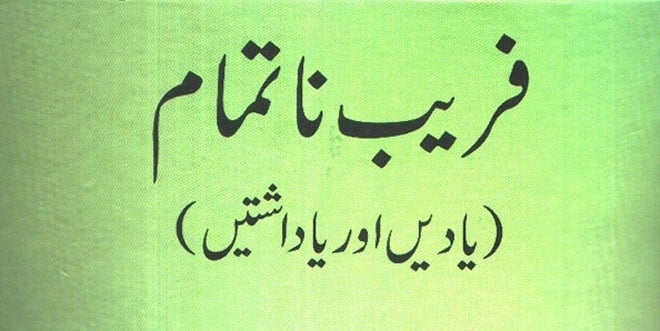
Faraib-e-Natamam by Jumma Khan exposes many revolutionaries and their game of money and power

Jumma Khan Sufi was not only a member of Imam Ali Nazish’s Karachi-based Communist Group (CPP) but also a close associate of Pukhtoon Zalmy; an organisation, as per the narrative of Jumma, that was involved in bomb explosions and other subversive actions in Pakistan from 1972-77. His memoirs "Faraib-e-Natamam" is an autobiographical account that helps the readers understand the infamous nexus of politics, informal trade, intelligence networks, regional and international actors and terrorists in former NWFP, Balochistan and FATA, especially during the Bhutto times.
Although it is a personal account originally written in the form of a diary in Pashto, many characters involved in that game are still alive and through this book Jumma has thrown the ball in their court. We hope that Syed Mukhtar Bacha, Afrasiab Khattak, Latif Afridi, Imtiaz Alam, Professor Azizuddin Ahmad, Rashed Rahman, Najam Sethi, Mir Hasil Bizenjo, Professor Jamal Naqvi, Professor Sarfraz, Nasim Wali Khan, Mian Iftikhar Hussain, Asfandyar Wali Khan, Fareed Toofan, members of Hoti and Ghulam Ahmad Bilour families etc will sooner or later share their common past with us. Although the book is pretty lengthy and badly edited, it is full of stories involving money and abuse of power by the revolutionaries and radicals.
Since late 19th century ideological and radical groups have been used by national and international intelligence agencies. Those who have read the literature penned in Rowlett Sedition Report 1917 till 9/11 can understand the phenomenon as a whole. Religion or sect-based politics, ideologies and nationalism are often used as a front banner under the guise of foreign policy initiatives (FPIs) while huge amounts of unaccounted money play a dominant role. So, one has to analyse the account of Jumma Khan as part of problem rather than part of solution.
It reminds me of an interview of a former Islami Jamiat Tulaba leader who belonged to a rural area. He told me that when he entered in a five star hotel of Lahore for the first time in his life to welcome Gulbuddin Hikmatyar, a leader of the West-sponsored Afghan jihad, all he witnessed was glossiness. He claimed to have lost his faith in the various salads he witnessed for the first time in his life. How intoxication of money and power corrupts ideologies is history and Jumma’s book is an addition to it.
Born in 1947, Jumma is a Yousafzai Pukhtun and has remained active in Pukhtoon politics since late 1960s. At page 89, he reproduces a conversation of Wali Khan with Ayub Khan of March 1969. Ayub told Wali "If you want to rule Pakistan, get rid of East Pakistan". As the book is written in the form of a diary, it has numerous entries by date. If you have read books Story Untold by Barrister Aizullah Sheikh (NAP President Sindh), Foreign Policy in Perspective by Benazir Bhutto and biography of Mir Ghous Bakhsh Bizenjo by BM Kutty, you can easily relate to the many entries of Jumma’s diary.
Some of the interesting entries in the book include:
Revolutionaries and radicals easily get support in a non-democratic setup and flourish in unsettled areas. In the absence of grass-root democracy and presence of unsettled areas, no nation state can handle the challenge posed by radicals. You may disagree with his analysis, but Jumma has shared his heart. Now other living characters must follow him and share their experiences.